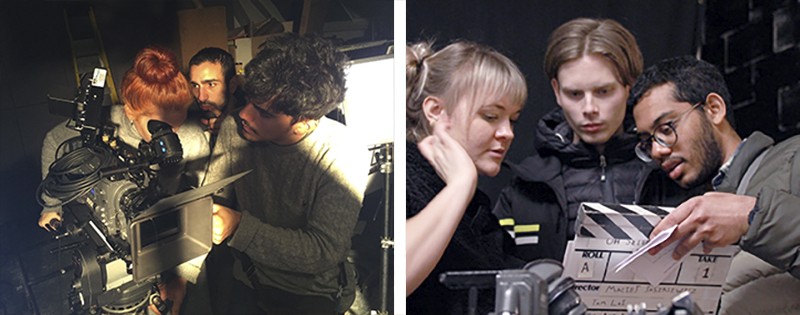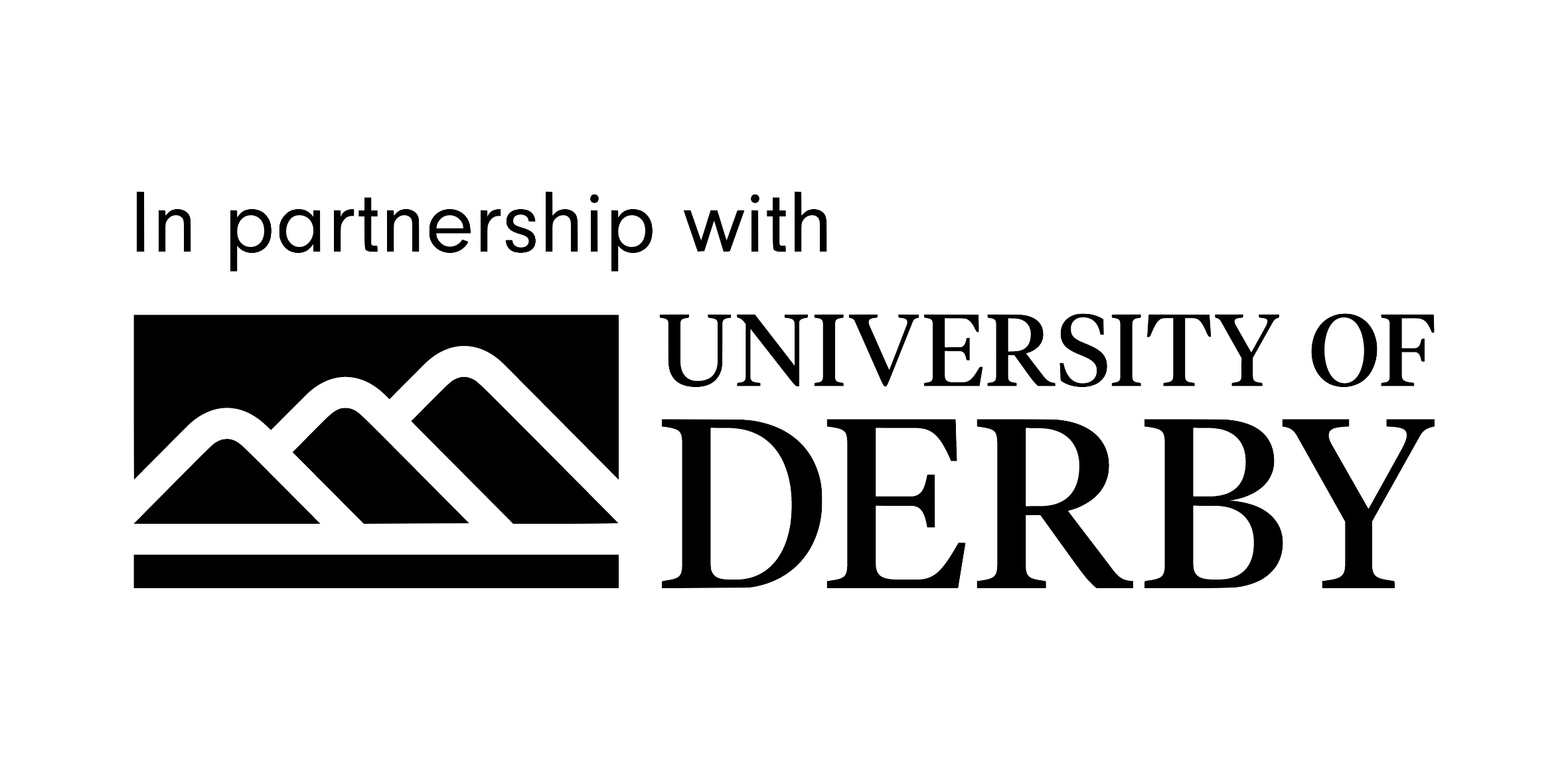MA Filmmaking
- Qualification Type: Masters
- Location: Fulham, London
- Course length: 1 year
- Study mode: Full-time
- Start date: September 2026
Our one-year MA Filmmaking degree is perfect for students looking to pursue advanced practical filmmaking training while also learning the skills to contextualise their creative choices through critical thinking.
Our distinctive approach to film education provides students with hands-on training, from industry professionals, across six filmmaking disciplines - directing, producing, editing, screenwriting, cinematography and sound. This intensive training across multiple roles means graduates leave LFA as well rounded filmmakers who can excel in their chosen field while remaining agile within a collaborative industry.
The quantity of films made, together with career focused research, ensures students produce a substantial showreel including a variety of disciplines of work ready to make their mark as a world class filmmaker.
MA Filmmaking Key Features
- Intensive and in-depth practical training in the key disciplines of filmmaking
- All course materials and film budgets are included in course fees
- Training with experienced film & TV industry tutors and guest speakers
- Masterclasses and Q&As with prominent filmmakers
- Direct access to industry with an expenses-paid trip to a leading UK film festival
- Shoot on s16mm film and high-end digital cameras*
- Development of pitching technique and other important soft skills
- Advanced critical thinking to inform your filmmaking practice
- Excellent student-to-tutor ratios
- Focus on future career and employability
Are you ready to push your filmmaking ability?
We're looking for creative individuals who can demonstrate a strong instinct for the grammar of visual storytelling as well as a passion for a professional career in filmmaking. You must be self-motivated, thrive in a collaborative environment and be willing to challenge your perceptions of your chosen specialisation and the landscape of film.
* * * * * * * * * * * * * * *
LFA is a registered higher education provider with the Office for Students (OfS) and listed on their Register, meaning that we meet the OfS requirements for academic standards, course quality, student support, and student protection.
This course is validated by the University of Derby. As a partner student you will be granted access to the University’s online learning environment ‘University of Derby Online (UDo)’ where you will be able to access programme resources related to your programme, the University’s library and your grades.
Information correct at the time of publishing (June 2025).
*Camera components, including filming formats, may be revised.
Our ethos is to learn by doing and using both Super 16mm and high-end digital cameras, such as Arri Alexa series, we will facilitate as many film productions as possible to improve your showreel, build your career path and further your understanding of the industry at an advanced level.
The research focus of this practical master’s centres around your individual career progression and will equip you with the skills to employ critical thinking and how it influences your chosen specialism, as well as the ability to confidently engage in debate around the landscape of film. You will further your theoretical understanding of the craft of filmmaking and contextualise it through practice. By doing so you will cultivate new research and development skills that will enable you to create films with depth, addressing issues, ideas and established structures that will be important to you throughout your career. We pride ourselves on our pioneering approach - our mission is to produce world-class filmmakers who can bring compelling stories to life.
Module One: Practical Filmmaking
This module is dedicated to learning key areas of screenwriting, directing, cinematography, editing and sound. Students develop analytical skills to contextualise their work and take part in a range of hands-on workshops. This phase of the course culminates in a collaborative project, which allows students to experience each role within all the given disciplines, broadening their knowledge and helping them to identify any area(s) to develop further.
Module Two: Collaborative Film Project
Students will work on several complex, team-based film projects in different roles to further enhance their skills in specific subject areas. Students learn to pitch and present their work in an industry framework and engage with existing material to develop their aesthetic sensibilities and strengthen their own practice. Students use professional equipment and are supported throughout the creative process where they receive constructive feedback by industry professionals.
Module Three: Research by Practice
The final module has a professional and career focus and looks at students' next steps and employability. It also enables students to contextualise their filmmaking within the relevant critical framework and adhere to sound ethical principles. Students will design and undertake a personal research project (a negotiated dissertation), aligned to their professional ambitions. These dissertations can take the form of a written or visual piece and can include previous work experience or scripts you have worked on as a form of research.
Additionally, our MA students have the opportunity to attend events, screenings and film festivals during their time on the course, providing an opportunity to gain tangible, practical experience in a nurturing industry environment and gain first-hand insight on the current industry trends and practices.
The full MA Filmmaking fee is £23,500 (course materials and film production budgets are all included in the course fee, with no additional charges).
Deposit: Successful applicants will then be issued with an offer letter. Upon acceptance of their place, applicants will be required to pay a non-refundable deposit of £4,500. The balance of course fees will need to be paid in accordance to the LFA Terms and Conditions and the date stated on the offer letter.
Application fee: £50.
For more information on fees and funding and how to spread the cost of your course fees, head to this page.
ENTRY REQUIREMENTS:
- A first degree (Minimum 2:2 or above)
- Not a graduate? Exceptions apply for applicants aged 21 or above, who may be considered through the experience route. To qualify, candidates must have 4-5 years of professional experience with established production companies or charitable organisations, demonstrating exposure to industry workflows, professional standards, and collaboration. Eligible experience includes professional work with recognised production companies or films that have had a mainstream cinematic release (paid screenings) or have been broadcast on terrestrial TV or pay-to-view streaming platforms. This ensures that applicants possess the practical experience and industry insight necessary to engage fully with the course and contribute meaningfully to their peers and learning environment. We evaluate each application on a case by case basis.
TO APPLY:
To begin your application process for a place on this course please apply via the UPCOMING COURSE DATES section below. As soon as we've received your application we’ll send you a confirmation email containing information on the next steps. Please check your ‘Junk Mail’ folder if you appear to have not received this email.
Entry materials - what do you need for your application?
- Completed online LFA application
- Example(s) of your filmmaking, e.g.:
- Digital portfolio (link to Website or Vimeo or YouTube link)
- Video showreel (link to Website or Vimeo or YouTube link)
- A short film (max 3-5 mins, please specify film genre and your production role) (link to Website or Vimeo or YouTube link)
- A short film script (10-20 pages) (pdf)
- CV/Resume
- Personal statement (up to 750 words) that outlines
- Your motivation
- Your background and filmmaking ambitions
- Ideas for a personal research project
- Why this course, and LFA as an institution, is the right choice for you
- Education certificates (degree-level qualifications only)
- Two references: academic or professional
- Scanned copy of your passport
Download/View our Creative Materials Guide for more information
If you meet our entry requirements, we offer an interview where we discuss your portfolio and motivations - we are looking for creative filmmaking ability/potential as evidenced through visual and written material. The interview will help you showcase your understanding and interest of film, as well as your awareness of the key elements of the course and a clear idea as to how completing the course will help you achieve career ambitions.
ENGLISH LANGUAGE REQUIREMENTS (For international students)
International students are required to provide proof of English Proficiency. For entry to LFA, you must prove you can read, write, speak and understand English to a B2 level on the Common European Framework of Reference for Languages (CEFR), or equivalent. This level of English is required to access the course content, understand the technical filmmaking terminology used on the course, and to obtain a Student Visa.
View/Download our IELTS Guide for more information
How do you prove your Level of English Proficiency?
You will normally have to provide an IELTS Academic score of 6.0 with no band below 5.5. We do consider equivalent qualifications or an alternative Secure English Language Test (SELT) from the alternatives below, however, only certificates obtained in the past 2 years can be considered:
- Oxford English Language Level Test (ELLT)
- Pearson Test of Academic English
- TOEFL iBT
- LanguageCert International ESOL SELT
- Cambridge English Scale
Who does not need to prove their English Proficiency?
If you have completed your studies in the past 2 years in a country where English is the first language (such as the USA, Canada or Australia) you may not need a formal English language qualification. We evaluate each application individually and, on a case-by-case basis.
Do I still need to demonstrate my English proficiency even if English is the official language of my country?
You may still be required to provide evidence of your English proficiency, even if English is the official language of your country, except if you are from one of the countries or territories listed on GOV.UK or you have completed a qualification equivalent to a UK degree in one of them.
What steps should you take if your English Proficiency does not meet LFA entry requirements?
If you don't think your English language meets our entry requirements, you are encouraged to contact us with evidence of your existing achievement for assessment. Please contact us with a copy of your certificate or language qualification so we can check on your behalf. We evaluate each application individually and, on a case-by-case basis. Please note that Duolingo is not a Secure English Language Test (SELT) and is not approved by the UK Home Office for visa or immigration purposes. As such, we are unable to accept it as valid proof of English language proficiency.
MAF6 (Students starting September 2025)
Term 1: 15th September 2025 - 12th December 2025
Term 2: 12th January 2026 - 10th April 2026
Term 3: 11th May 2026 - 14th August 2026
To apply online please click on the course date below.
-
14 September 2026 - 17 September 2027
Course Fee: £ 23,500


